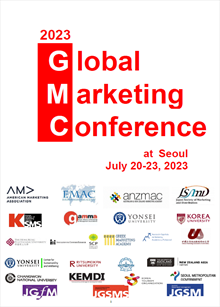간행물
Global Marketing Conference

- 발행기관 글로벌지식마케팅경영학회
- 자료유형 학술대회
- 간기 부정기
- ISSN 1976-8699 (Print)
- 수록기간 2014 ~ 2023
- 주제분류 사회과학 > 경영학 사회과학 분류의 다른 간행물
- 십진분류KDC 325DDC 330
권호리스트/논문검색
2020 Global Marketing Conference at Seoul (2020년 11월) 372건
161.
2020.11
구독 인증기관 무료, 개인회원 유료
4,000원
162.
2020.11
구독 인증기관·개인회원 무료
163.
2020.11
구독 인증기관·개인회원 무료
164.
2020.11
구독 인증기관·개인회원 무료
165.
2020.11
구독 인증기관·개인회원 무료
166.
2020.11
구독 인증기관 무료, 개인회원 유료
3,000원
167.
2020.11
구독 인증기관 무료, 개인회원 유료
4,000원
168.
2020.11
구독 인증기관 무료, 개인회원 유료
4,000원
169.
2020.11
구독 인증기관·개인회원 무료
170.
2020.11
구독 인증기관 무료, 개인회원 유료
5,500원
171.
2020.11
구독 인증기관 무료, 개인회원 유료
This paper discusses the influence of QR codes on consumers’ purchase decision in green advertising. We found that QR codes can improve advertisement value, perceived green value, and green trust. This relation eventually leads to a positive influence on consumers’ purchase intention.
4,000원
172.
2020.11
구독 인증기관 무료, 개인회원 유료
This paper presents an in-depth analysis of a random sample of 100 consecutive Facebook posts by a specialist industrial firm which is its industry leader in terms of brand performance on Social Media. It demonstrates how the messages content, encoding, and interactivity strategies achieve the Page’s audience engagement.
4,800원
173.
2020.11
구독 인증기관 무료, 개인회원 유료
4,000원
174.
2020.11
구독 인증기관 무료, 개인회원 유료
This paper suggests a theoretical conceptual framework focusing on the individuals' affective process of country image evaluation, through the examination of the positive relationship among the country's responsiveness to individuals A-R-C needs with, and the country's emotional attachment. The main contribution of this paper is that it is operating as countries’ “BIAS map” for their future actions and policy strategies for their individuals’ well-being safeguard.
4,500원
175.
2020.11
구독 인증기관·개인회원 무료
GENDER DIFFERENCES IN THE EFFECTS OF INDIVIDUAL INFLUENCE AND SUSCEPTIBILITY ON NEW PRODUCT ADOPTION
176.
2020.11
구독 인증기관·개인회원 무료
177.
2020.11
구독 인증기관 무료, 개인회원 유료
Abstract submitted to the Special Section of Asia Pacific Journal of Marketing and Logistics (APJML) on “Product Innovation & Consumer Behaviors”
3,000원
178.
2020.11
구독 인증기관 무료, 개인회원 유료
The study proposed a dual-path model to examine the relationship between customer perceived hotel innovativeness and customers’ interactivity, building the signaling theory. The model was tested with hotel customers from China. The findings suggest that customers’ perceived hotel innovativeness not only has a positive and direct impact on their interactivity, it also indirectly contributes to customers’ interactivity via two indirect paths, one featuring a cognitive-economic motivation pathway and the other featuring an affective-motivation pathway.
3,000원
179.
2020.11
구독 인증기관 무료, 개인회원 유료
This study investigates the association between Food Neophobia and the intention of the consumers to buy fish farmed with insect-based flours. The findings suggest that buying intention is strongly influenced by the attitude of consumers toward this type of fish and both Food Neophobia and Food Technology Neophobia negatively influence consumers’ attitude.
4,500원
180.
2020.11
구독 인증기관 무료, 개인회원 유료
3,000원

